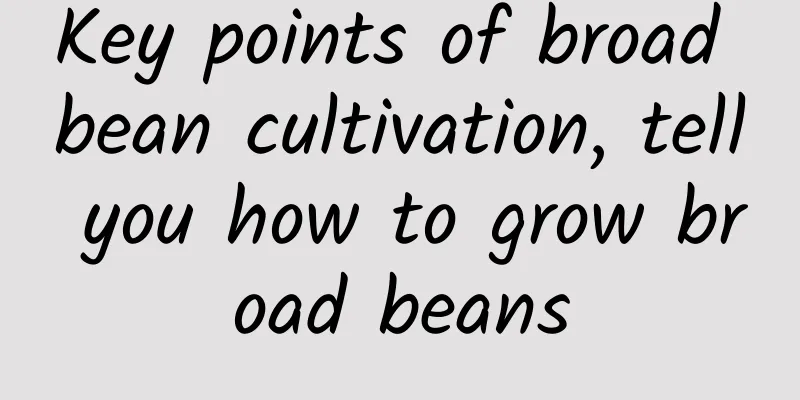Key points of broad bean cultivation, tell you how to grow broad beans

|
Today I will tell you about the key points of broad bean cultivation. Please take a look. 1. Choose the right crop rotation and plot:Broad beans should not be planted continuously. Continuous planting will make the plants sterile. The number of rhizobia is small, the activity is low, the pods are few, and they are prone to disease. When planting broad beans, crop rotation should be implemented for at least 3 years. Broad beans are adapted to slightly heavy and moist soil, but it is better to plant them in deep, fertile clay loam or sandy loam. 2. Sowing at the right time:Broad beans are cold-resistant and can be sown from late February to mid-March. Before sowing, deep plow the soil and apply appropriate basal fertilizer to make a flat bed 1 meter wide. Plant two rows in each bed, dig holes in the bed, the hole depth is 6-9 cm, the hole distance is about 20 cm, sow 2-3 seeds in each hole, and level the bed surface. 3. Topdressing and watering:Adequate water supply should be provided 1-2 days after sowing to promote early germination and early uniform seedlings. When the seedlings grow to 3-4 true leaves, an appropriate amount of nitrogen fertilizer should be applied, and phosphorus and potassium fertilizers should be applied in stages during the growth period. Spraying potassium dihydrogen phosphate or trace elements such as boron, molybdenum, magnesium, and copper during the flowering and pod-setting period can reduce flower and pod drop, promote seed development, and increase yield. In the early stage of broad bean growth, inter-cultivation is the main method to increase soil water retention and permeability. The soil should be kept moist from the beginning of budding and flowering. Lack of water during the flowering and pod-setting period can easily cause flower and pod drop, and the beans will not be full. 4. Cultivation and pruning:After the broad bean seedlings emerge, the seedlings should be checked and the gaps should be filled in time. During the seedling stage, multiple intertillage and weeding should be carried out, and the soil should be raised to the roots of the plants to prevent lodging. Broad beans have a strong branching ability, and the branches and pods in the later stage are few and easy to cause field closure. In production, the excess side branches should be broken off and the growth points should be removed in time to reduce nutrient consumption, increase the pod setting rate, and promote full beans and uniform maturity. 5. Harvest at the right time:The young pods of broad beans can be harvested in batches, from bottom to top, once every 7-8 days. The mature seeds can be harvested when the leaves fall and the middle and lower pods are fully mature, and then dried, threshed and stored. |
>>: Broad bean planting technology and cultivation techniques
Recommend
How is 24? Review and website information of 24
What is 24 Hours? 24 Hours is a famous Canadian fr...
Calories and nutrition of red bean soup
Red bean soup is a very popular health-preserving...
How is the Indian Immigration Bureau? Indian Immigration Bureau Reviews and Website Information
What is the website of the Bureau of Immigration, ...
What is the Defense Language Institute like? Reviews and website information of the Defense Language Institute
What is the Defense Language Institute? The Defens...
cherry
Introduction Cherry (scientific name: Cerasus pse...
How is Kleenex? Kleenex reviews and website information
What is Kleenex? Kleenex is a world-renowned tissu...
What is Accurist like? Accurist review and website information
What is Accurist? Accurist is a British watch bran...
The benefits of eating lotus seed heart
Lotus seeds are one of the most popular high-nutr...
How to eat kiwi fruit and its medicinal value
I believe that many friends don’t know much about...
How to grow Strelitzia? How to grow Strelitzia and what to pay attention to
Strelitzia is a beautiful ornamental plant with g...
The therapeutic effects of eggplant
In many cases, we still use eggplant for food. So...
The efficacy and function of drinking Yuan Fuju in water
Yuan Fuju, also known as Furongju, is a medicinal...
How long is the shelf life of Anchor butter
Nowadays, people like to eat Western food very mu...
How to cultivate purslane trees? How to propagate purslane trees
The purslane tree is a small ornamental tree and ...
What is SunTrust Bank like? SunTrust Bank reviews and website information
What is SunTrust Bank? SunTrust Bank (NYSE: STI) i...









